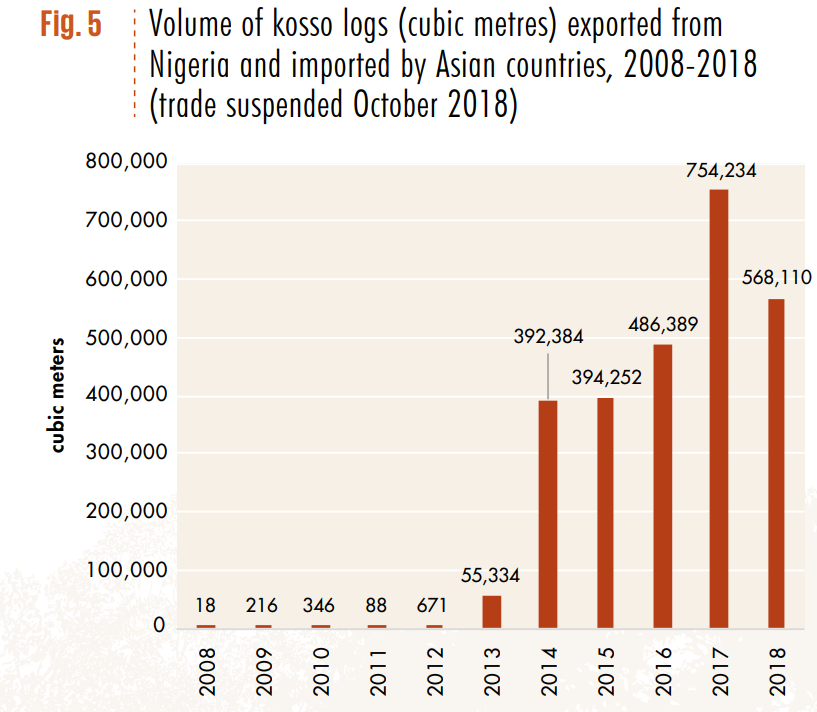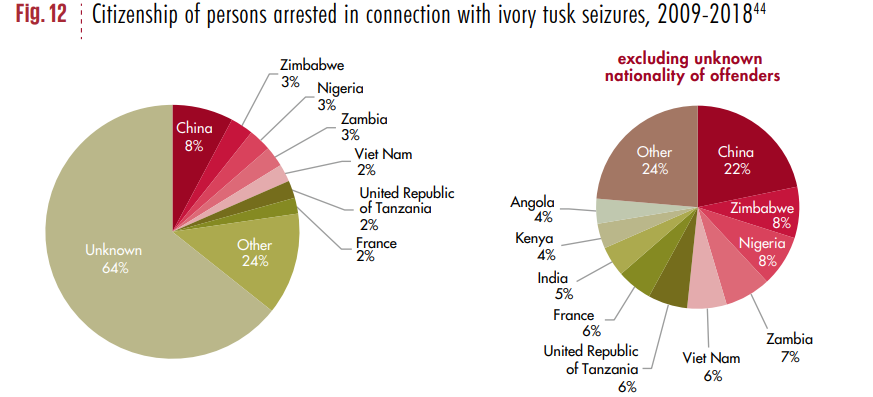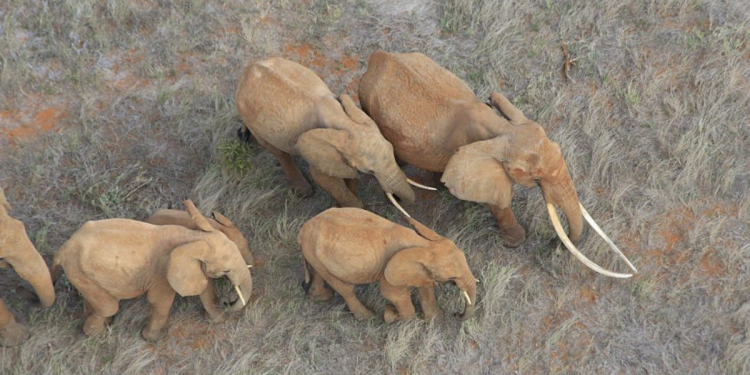Nigeria’s strategy to combat wildlife and forest crime was recently launched by the Federal Department of Forestry and the National Stakeholders Forum for Combating Wildlife and Forest Crime.
This strategy document is coming at a time when wildlife crime is on the rise in Nigeria and the country is becoming “a primary transit hub for trafficking in illicit wildlife products arriving in the country from Central Africa through its porous borders”. According to the UNODC, Nigeria accounts for 60% of global imports of a species of rosewood, a tree valuable for the making of musical instruments and furniture, and most of these are from illegal exports.

Chart: Source World Wildlife Report 2020
Nigeria is also indicted as part of the illegal trade chain of Ivory, with seizures increasing from 5,629 kg between 2009 and 2011, to approximately 11,769 kg in the period between 2012 to 2014, and growing to approximately 12,211 kg between 2015 and 2017. This growth in seizures is happening despite a global reduction in trafficking of Ivory. Of persons identified by citizenship arrested in connection to Ivory seizures, Nigeria shares second position with Zimbabwe, with China leading.

Chart: Source World Wildlife Report 2020
Even during Covid 19, Wildlife trafficking through Nigerian Ports continued unabated.
The maiden strategy document, which covers from 2022 to 2026, received technical support from the United Nations Office on Drugs and Crime (UNODC) with funding provided by Germany within the “Strengthening Nigeria’s Response to the Trafficking of Wildlife and Forestry Products” project.
The strategy contains a five-year goal that by 2026, “Nigeria will have made demonstrable progress in reducing wildlife crime. At the same time, its law enforcement and criminal justice system will have the requisite capabilities and a fit-for-purpose legal framework to effectively and collaboratively tackle wildlife crime”.
This first document is critical for setting the country on the correct path towards attaining the vision of a Nigeria Free of Wildlife Crime and according to the document, the 2022–2026 National Strategy aims to lay the foundation for sustained, long-lasting change. To achieve this, key stakeholders must have the capabilities and policy and analytical frameworks to understand, detect and deter wildlife crime, enforce the law and effectively sanction criminals.
The strategy sets out its objectives as described below:
Enhance institutional capabilities
The strategy aims to develop the capabilities in all relevant institutions to drive evidence-based action to understand, detect and deter wildlife crime, enforce the law and sanction those involved in wildlife crime.
Strengthen the legal framework
The strategy will create enabling legal and sustainable trade, protect Nigeria’s fauna and flora, and deter wildlife crime through a harmonised and strengthened legal framework.
Wildlife crime must gain recognition as a serious crime and by strengthening the legal framework, Nigeria can ensure successful and fair prosecutions, resulting in swift and certain sanctions that deter wildlife crime perpetrators.
Increase collaboration
The policy will ensure strong coordination, led by accountable partners, to facilitate national and international collaboration and information sharing between all relevant stakeholders to combat wildlife crime. Implementing the National Strategy will require all stakeholders to pull together toward the shared vision.
This collaboration and coordination will facilitate effective implementation of the strategy and ensure effective and proactive information and intelligence sharing to prevent and combat wildlife crime.
Honour commitments
One of the objectives of the strategy is to ensure compliance with national and international commitments to regulate legal trade and combat wildlife crime. Nigeria must adhere to its national and international commitments related to legal trade and wildlife crime because honouring these commitments is a clear demonstration of Nigeria’s willingness to tackle wildlife crime. This will require that the country commit adequate financial and human resources to address wildlife crime.
Remove enablers of crime
The strategy tackles corruption risks and prevents financial crimes like illicit financial flows which are enablers of wildlife crime. This will reduce the opportunity for, and benefits from, wildlife crime. Taking proactive steps through targeted interventions will provide a conducive environment for the agencies to effectively tackle wildlife crime.
Raise awareness of wildlife crime
Generating social and political will by raising awareness among all stakeholders about the value of nature and the threat of wildlife crime is a core objective of the strategy. To drive this awareness, political and social will are important because raising awareness at all levels can facilitate a commitment to change.
Provide alternative livelihoods
Empowering local communities who had benefited from the proceeds of wildlife crime is identified as an important deterrent to wildlife crime, The strategy will provide alternative sources of income as well as develop wildlife crime prevention initiatives. This approach will provide financial resilience so that individuals do not need to engage in wildlife crime. This objective will target communities more vulnerable to engaging in wildlife crime.
Nigeria has identified resource mobilisation as the pathway to achieving these set goals. Achieving the set objectives means a Nigeria with the institutional commitment, necessary organisational structures, and capabilities to address transnational and domestic wildlife crime effectively.




